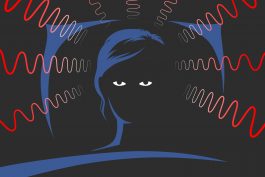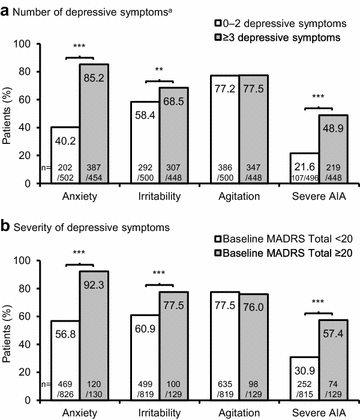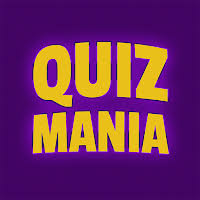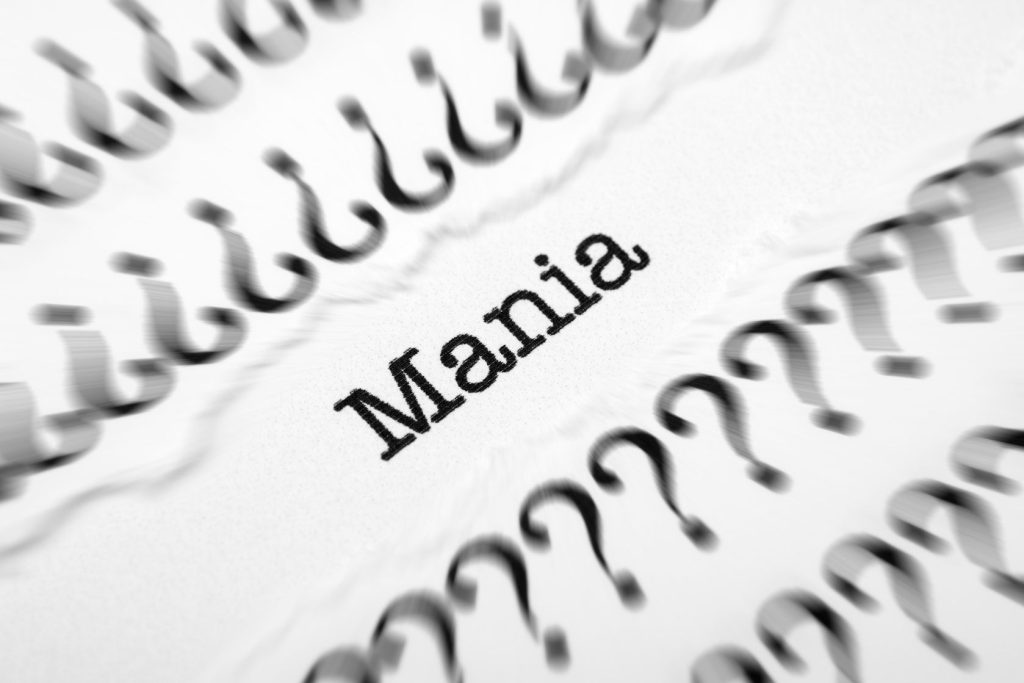Mania is a serious mental illness. It can affect people in different ways, and not everyone experiences the same symptoms. This article will help you understand what mania is, what types of mania exist, how to conduct a mania test and the results of your test.
Contents
Understanding Mania

Mania is a mental illness that is characterized by elevated mood, high energy levels, and decreased need for sleep. Furthermore, some people also experience racing thoughts, increased activity, and impulsiveness. Note that, mania can be severe enough to cause problems in someone’s life such as job loss, relationship difficulties, or even hospitalization.
Types of Mania
Hypomanic
The first type of mania is called hypomanic. It’s characterized by a mood state which is out-of-the-ordinary. Something that most people would not feel in their daily life. But it does not mean there are serious problems yet. As the person may be feeling more energetic, have more thoughts, be more talkative, and be less inhibited.
Manic
The second type of mania is called manic. It’s a more severe form of the illness where there are problems in the person’s life due to their elevated mood state. The person may feel extremely happy or irritable, have increased energy levels, decreased need for sleep, racing thoughts, and increased activity.
Degrees of Mania

While there is no official list of mania degrees, there are usually three levels: mild, moderate, and severe.
Mild Mania: This is the earliest and least severe stage of mania. At this level, there are some symptoms present. But they do not significantly interfere with a person’s life.
Moderate Mania: This is when the mania symptoms start to cause more problems in someone’s life. They may have difficulty concentrating, be irritable or agitated, and have trouble sleeping.
Severe Mania: At the highest level, mania is interfering with someone’s daily life and activities due to their severe mood state, thoughts racing faster than normal, high energy levels, decreased need for sleep as well as other symptoms. This may lead to hospitalization and/or a stay in an institution.
Signs And Symptoms of Mania

General Symptoms
Physical Signs
- Talking quickly,
- Running or walking fast,
- Being fidgety and restless,
- Moving around a lot.
Behavioral Changes
- Excessive talking,
- Increased energy,
- Decreased need for sleep.
Mood Changes
- Happiness,
- Excitement,
- Irritability.
- Cognitive Signs
- Racing thoughts,
- Difficulty concentrating,
- Making poor decisions.
Hypomania Symptoms
Mild Mania
- Psychomotor agitation,
- Less need for sleep than usual.
Moderate Mania (Bipolar Disorder II)
- Excessive involvement in pleasurable activities that have a high potential for painful consequences,
- Pessimistic thoughts and feelings of being worse off than others even when things are going well,
- Irritability,
- Grandiosity,
- Markedly increased energy, activity, or restlessness.
Severe Mania (Bipolar Disorder I)
- Hallucinations and delusions,
- Incoherent speech,
- Rage or violence,
- Depression and suicidal thoughts.
- Feeling sad or empty,
- Loss of interest in activities once enjoyed,
- Weight changes, either up or down,
- Changes in sleep habits (too much or too little),
- Agitation or restlessness.
Decoding Mania Test
Mania tests are commonly used in the mental health industry to determine whether a person has mania or not. It can also be called an assessment of bipolar disorder because it focuses on one type of mood (mania). If you have been experiencing symptoms such as increased activity and elevated mood, a mania test may be the right step for you.
Information I Get From Mania Test
A mania test will help to determine whether or not you have bipolar disorder. Furthermore, it can also help to identify the type and degree of mania that you are experiencing if you do have bipolar disorder. In some cases, a mania test may be used to determine the severity of your mania.
The Reason I Take Mania Test
You may be experiencing symptoms of mania, such as increased activity levels or elevated mood. Thus, you can use a mania test to determine whether you have bipolar disorder and the exact type of your illness.
Rough Idea of Mania Test
A mania test usually consists of questions that focus on manic episodes in someone’s life. The questions may ask about the current state of your mood as well as how you felt in the past. In addition, the questions and answers are usually based on bipolar disorder symptoms related to mania. Such as increased energy levels or decreased need for sleep.
Tips For Mania Test
If possible, try to write down your answers before taking a mania test. As this will be an online assessment and not face-to-face consultation. Furthermore, it would be better if you could write down your answers instead of typing them on the computer. Because, this will help to remember all of the information that is related to mania, such as symptoms and triggers.
The Course of Action After a Mania Test
If you are interested in receiving professional help to treat bipolar disorder, please consult with a qualified medical doctor or therapist. The results of your mania test can provide the basis for further diagnosis and treatment. However, they do not replace an actual evaluation by a licensed mental health specialist.
Accuracy of Mania Test
A Mania test is not 100 percent accurate because it does not provide a physical examination or lab tests. Furthermore, it can help to determine whether you have bipolar disorder and the type of your illness but for an accurate diagnosis, a qualified medical professional should supervise.
Questions To Ask Me Before Mania Test

- Are you currently taking any medications or drugs?
- Do you have a history of mental health in the family?
- Do they suffer from bipolar disorder, depression, anxiety disorders, and so on?
- Is there anyone who has had suicidal thoughts or attempts in the family?
- Do you have any prior diagnosis of bipolar disorder, depression, or anxiety disorders?
NOTE: Do not take the test if you are taking any anti-depressant medications without talking with your doctor. And, if you are feeling suicidal, please seek professional help right away. Since the mania test will not be able to assess whether or not you have bipolar disorder with the current symptoms that you may express. Thus, you do need proper diagnosis and treatment from a medical doctor or therapist as soon as possible if your condition is critical.
The Procedure Of Taking A Mania Test
When you take a mania test, it is important, to be honest with the answers. The questions are usually based on manic symptoms that people experience. Furthermore, it is also important to answer all of the questions. because some questions may be used to determine the severity of your illness.
Sample Questions Of Mania Test
Below are some sample questions that you may encounter when taking a mania test:
- What is your mood like right now?
- How has your mood changed in the past few weeks or months?
- Do you feel more energetic than usual?
- Do you have less need for sleep than usual?
- Have you been feeling happy and optimistic?
- Do you feel more self-confident than before?
- Have you been feeling like your thoughts are racing and uncontrollable?
Sample Questions For Hypomania Test
Below are some sample questions for the hypomania test:
- How has your energy been recent?
- Have you had any problems with sleeping in the past month or two?
- Are you feeling more productive than usual?
- Do you feel like having a lot of ideas and being able to carry them out successfully without much effort on your part?
- Are you happier than usual and can control your emotions more easily?
- Do you feel like being in a good mood most of the time, even when things don’t go according to what you want them to be?
Sample Questions For Depression Test
Below are some sample questions for the depression test:
- How has your mood been recent?
- In the past month, how often have you had negative thoughts about yourself or life in general?
- Have you lost interest in activities that were once pleasurable to you?
- Do you feel like everything is an effort and it’s hard for you to make even the simplest decisions?
- Do you feel like your mood is just “empty” and nothing seems to matter anymore?
Result And Interpretations
The result of a mania test can be used to determine whether or not you have bipolar disorder. The answer sheet will provide the percentage of how many questions you answered correctly and incorrectly, which is called your ‘passing score.’
Passing score on the mania test
A passing score on the mania test means that you have answered at least 70 percent of the questions correctly. The answer sheet will provide the percentage of how many questions you answered correctly and incorrectly, which is called your ‘passing score.’
If I scored high on the mania test
A high score on a mania test may indicate that you are at risk for bipolar disorder. It also means that you should seek professional help from a qualified medical doctor or therapist to diagnose and treat this condition.
If I scored low on the mania test
A low score on a mania test is not conclusive and you should seek professional help from a qualified medical doctor or therapist to diagnose and treat this condition.
Handling Results
If you do not like the results of your mania test, it is important to remember that bipolar disorder is a treatable illness. There are many ways to help manage the symptoms of bipolar disorder and there are many people who live successful lives with this condition. You are not alone.
There are many ways to help manage the symptoms of bipolar disorder:
- Seek professional help from a qualified medical doctor or therapist
- Join a support group for people with bipolar disorder
- Educate yourself about bipolar disorder
- Find a therapist who specializes in cognitive-behavioral therapy (CBT) or dialectical behavior therapy (DBT)
Mania FAQs
Below are some common questions and answers about mania:
Q: How common is mania?
A: Mania is not a common condition. It affects about one percent of the population.
Q: How long does a manic episode last?
A: A typical mania can last for days or weeks, but some people may have symptoms that last up to several months.
Q: What are the different types of mania?
A: There is not just one type of mania because the condition can take many forms. The type of mania that you will experience depends on the severity and duration as well as your symptoms, which are unique to each person’s situation.
Q: What is rapid cycling bipolar disorder?
A: Rapid-cycling bipolar disorder is when a patient experiences four or more manic episodes in one year along with one or more major depressive episodes. It is estimated that about 20 percent of people with bipolar disorder have rapid cycling.
Q: What causes mania?
A: The exact cause of manic episodes in bipolar I disorder is unknown, but it can be caused by a combination of genetic and biological factors as well as environmental influences such as stress and trauma.
Q: What is the difference between mania and hypomania?
A: Mania is a more severe form of bipolar disorder that includes symptoms such as grandiose delusions, hallucinations, and paranoid thoughts. Hypomania is a less severe form of mania that involves symptoms such as increased energy levels and self-confidence, but it does not cause significant impairment in social or occupational functioning.
Conclusion
Bipolar disorder is a treatable condition and many people live successful lives with this illness. You are not alone. So seek help from qualified medical doctors or therapists to diagnose and treat your condition now. Herein, the mania test is an important part of understanding the situation. It’s easy to take the online Mania test (Bipolar test). Just follow a few steps given on this page and you can take the mania test online.
A Word From Therapy Mantra
Your mental health — Your psychological, emotional, and social well-being — has an impact on every aspect of your life. Positive mental health essentially allows you to effectively deal with life’s everyday challenges.
At TherapyMantra, we have a team of therapists who provide affordable online therapy to assist you with issues such as depression, anxiety, stress, workplace Issues, addiction, relationship, OCD, LGBTQ, and PTSD. You can book a free therapy or download our free Android or iOS app.


